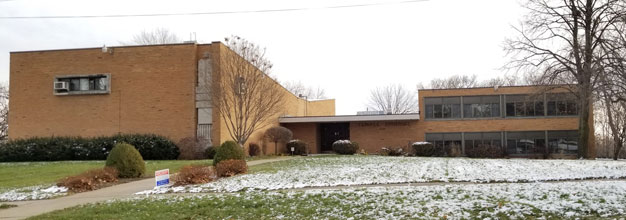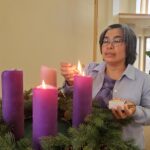
Anti-Semites vandalized Temple Emanuel in Davenport, above, on the first night of Hanukah earlier this month. The Diocese of Davenport released a statement condemning the act, and Bishop Thomas Zinkula spoke at an ecumenical virtual prayer vigil Dec. 14.
By Barb Arland-Fye
The Catholic Messenger
Jews, Christians, Muslims, Unitarians and others gathered virtually Dec. 14 to express solidarity with their Jewish brothers and sisters in the aftermath of an act of anti-Semitism committed against Temple Emanuel in Davenport.
Rabbi Linda Bertenthal of Temple Emanuel hosted the Zoom prayer vigil four days after discovering anti-Semitic graffiti on the temple’s exterior back entrance “just as the first night of Chanukah (also spelled Hanukkah) was beginning.” The unknown perpetrators spray-painted “John 8:44” on the wall, misappropriating a passage from John’s Gospel. Temple Emanuel’s president reported the crime to local police and Rabbi Bertenthal made a report with the FBI. “Both have opened investigations, as it is both a state and federal crime,” she said.
Bishop Thomas Zinkula, the first of a dozen speakers at the prayer vigil that drew more than 65 people, shared this statement:
“The Diocese of Davenport strongly condemns the desecration of Temple Emanuel. An act of anti-Semitism at this holy place of worship, at the beginning of Hanukkah, targeting our Jewish friends and neighbors, is deeply disturbing. The Church decries hatred, persecution and displays of anti-Semitism directed against Jews at any time and by anyone. The scandalous misappropriation of the Christian Scripture in this incident was especially disheartening. Along with the members of other faith traditions, and with all people of goodwill in our community, we stand by the members of the Temple Emanuel congregation.”
Rabbi Bertenthal expressed her appreciation for the “huge outpouring of statements of support from the Quad Cities and Iowa communities and indeed throughout the Midwest. People came to our next Shabbat service to show their support,” she told The Catholic Messenger prior to the prayer service. “The outpouring was particularly strong from the Christian and Catholic communities, who felt the special sting of their own scriptures being used against us, but we have also received support from the Muslim community and a variety of people not motivated by faith, but by ethics and humanity.”
The past few days have been difficult, she admitted during the prayer vigil, but also beautiful days “overflowing with love and support.” She will not look back on the year 2020 dwelling on an act of hate, but on the love and light in response to it.
Hanukkah is an eight-day “Festival of Lights” that “commemorates the rededication during the second century B.C. of the Second Temple in Jerusalem, where according to legend Jews had risen up against their Greek-Syrian oppressors in the Maccabean Revolt (history.com/topics/holidays/hanukkah).”
Jews celebrate with the lighting of the eight-candle menorah, dining on traditional foods, playing games and exchanging gifts.
Rabbi Emeritus Henry Karp of Temple Emanuel explained the symbolism of the menorah’s candles, lit on successive days. “One candle joined by another and then another until on the eighth night the menorah is filled with burning candles and their light fills the room,” he said. “Each and every one of us is a candle. We shed light; our light drives back the darkness, the darkness of hate, and replaces it with the light of love, respect, community.”
However, Hanukkah is more than just candles, games, food and presents, he told The Catholic Messenger. “It challenges us. Do we have the courage to be Maccabees? Will we stand up for what we believe in defense of who we are? Will we stand by others who find themselves under attack for what they believe and who they are? It is a story about defending our freedom, but most important of all, it is a story about standing up to those who hate, those who would diminish others because they do not fit their narrow mold. A story like this should remind us that Hanukkah is real and it carries an important message for us all, Jew and non-Jew alike.”
During his comments at the vigil, the Rev. Matthew Coomber, a theology professor at St. Ambrose University in Davenport, emphasized the importance of resistance to hate. “Resistance is often seen as a ‘taking away from.’ It is also an act of love, of giving, of putting oneself out there for the sake of neighbor. It’s saying, ‘You’re not going to stand alone.’” He called resistance a gift in which individuals come together, building strength and forming community to resist hate. He encouraged the vigil’s participants to share what they were doing with the young people in their life, to help them understand the importance of standing up and saying no to hate.











